If you want to sell products online, you need a reliable eCommerce solution.
SamCart and Shopify are two of the best options currently available, and while they are similar in a lot of ways, each platform has its own set of unique features that make it suitable for some businesses and not for others.
For instance, Shopify continues to grow in popularity, with over 400 million online merchants and 1.75 million sellers. Still, the platform is not the best solution for someone who sells a single digital product.
In this review, I will compare all the different aspects of the two platforms, from listing products, design customization, and sales funnels to integrations, pricing, and more.
Once you know how these two eCommerce giants stack up against each other, you can make a better-informed choice as to which one is best for you – SamCart, or Shopify.
So, without further ado, let’s get to the SamCart vs. Shopify comparison.
SamCart vs. Shopify: Overview
SamCart is an eCommerce services platform that also offers comprehensive drop shipping services for physical products.
SamCart was founded in 2014, and compared to Shopify, it’s a relatively new platform for eCommerce solutions. However, it has grown at a phenomenal rate thanks to its impressive features, which make it easy for anyone to start selling and accepting orders online.
Today, SamCart powers over 17,000 businesses from across the world.
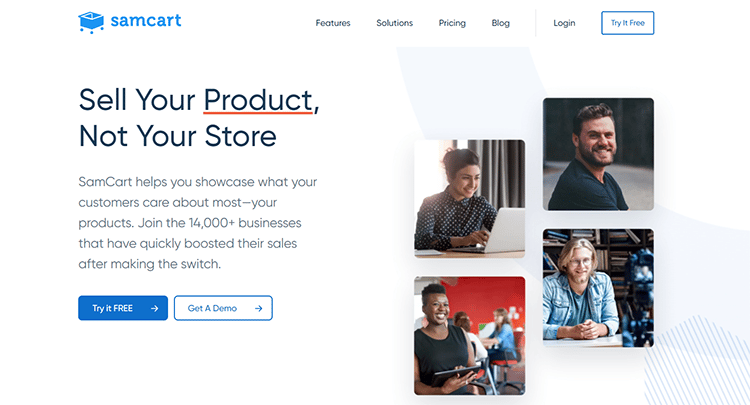
Its mission is to become the number one shopping cart software by helping you reduce your abandoned shopping cart rate and close more sales.
Samcart focuses on helping to increase the amount of each transaction so you can boost your profits.
This platform is best if you have a smaller number of products and you need a way to create individual eCommerce funnels. SamCart excels in this regard.
The e-Commerce platform is particularly effective for people selling digital products (such as ebooks and courses) who require a platform with upselling and split-testing capabilities for advanced online businesses and help you sell online with sales funnel.
Some of the key features of SamCart are:
- Drag-And-Drop Builder: You can easily customize your website, including checkout pages, with zero coding knowledge with Samcart e-Commerce features and sales funnel.
- Predesigned Samcart Templates: All the hard work is already done with templates and templates code. Simply plug in your products and begin selling and creating your checkout pages with premium e-Commerce themes.
- Unlimited Products: With the user-friendly platform e-Commerce feature, you can sell anything you want without any limitations on the types and numbers of products.
- Localization: The platform allows you to sell in any currency or language you choose to reach a global market.
- Digital Wallet: Add one-touch purchases with Google Pay and Apple Pay to speed up your checkout flow.
You can read more about the platform in my Samcart review.
Shopify was founded in 2006 and is currently one of the world’s largest eCommerce builders.
It is best suited for people who sell multiple physical products and require a storefront where users can add products to their shopping cart and check out.

The platform has a lot of amazing features, but unlike SamCart, it doesn’t offer upsells and split testing out of the box.
This means that eCommerce entrepreneurs have to look for ways to integrate third-party software to help them build funnels and your checkout page with Shopify and do not need to use third-party websites for your transactions.
Also, customizing checkout pages isn’t as easy on Shopify as it is on SamCart.
Some of the key features of Shopify are:
- Sell Everywhere: Shopify allows you to explore multiple ways of selling, including websites, social media, and online marketplaces.
- Robust Marketing Features: The platform offers built-in tools that take the guesswork out of marketing your products.
- Easy Management: You can manage every aspect of your business – from orders and fulfillment to payments, payment systems, and more – from one convenient dashboard.
You can read more about the platform on my Shopify review.
Key Differences
Before you make your choice between these two platforms, it’s important to understand the distinct differences when looking at Samcart vs. Shopify when it comes to their features.
SamCart is a dedicated shopping cart and checkout solution, whereas Shopify does so much more than that which can make it more profitable.
Here are the key differences between the two platforms.
Pricing
- SamCart: Pricing starts at $49/month for the basic plan. The highest-priced plan costs $199/month.
- Shopify: Shopify pricing has a basic plan priced at $29/month, and plans range up to $299/month for large businesses with more than one retail store.
Ability to Scale
- SamCart: SamCart has all the advanced features you need to scale your business at $199/month. If you require more hands-on attention, you can opt for the “Enterprise” plan, which comes with white-glove service.
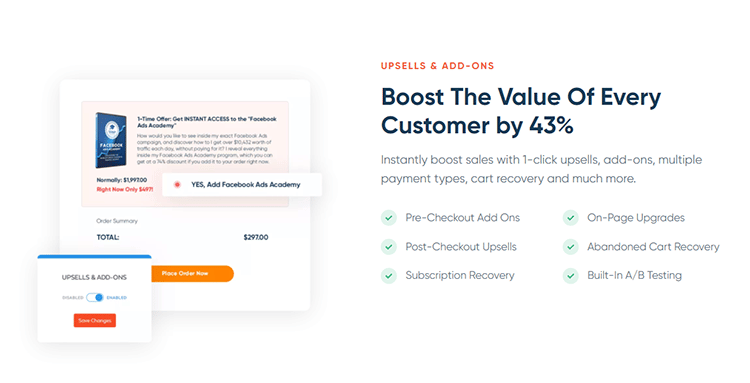
- Shopify: Shopify has an “Advanced Shopify” plan for growing businesses with multiple retail stores at $299/month. Shopify supports enterprise-grade solutions for large businesses and high-volume merchants on the “Shopify Plus” plan.
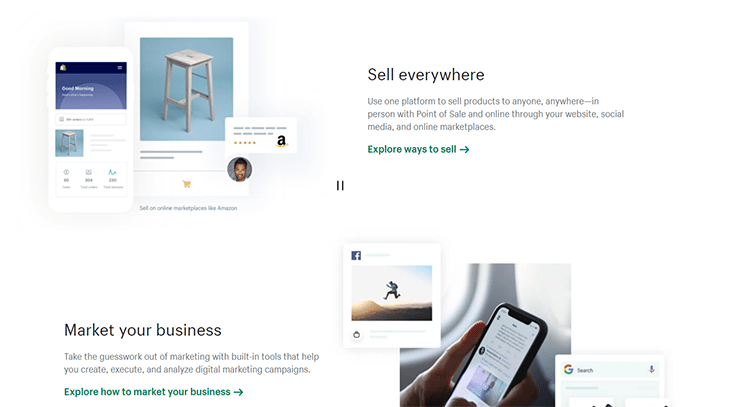
Shopping Cart Design (with simplified payment processing options)
- SamCart: SamCart’s design and sales funnel capabilities are much more flexible and advanced than Shopify’s, which isn’t surprising since this is a dedicated shopping cart software.
- Shopify: Although Shopify’s shopping cart design isn’t as modern as SamCart, it’s still enough to create optimized, high-converting checkouts that you can customize.
Payment Integrations (for business and online store)
- SamCart: SamCart integrates with payment providers such as Stripe, PayPal, and Authorize.net.
- Shopify: Shopify Payments offers integration with a greater range of payment processors as payment gateways, including PayPal, Stripe, SagePay, and more. You can also use default Shopify Payments, which is the platform’s own payment gateway solution.
Listing Products
The way you list your products has a direct impact on your sales, which is why it’s important to choose a platform that allows you to list your items in an effective and optimized way.
Let’s see how the Samcart vs. Shopify comparison looks like.
SamCart:
The process of listing your products on SamCart is pretty straightforward. Simply click on “New Products” on your dashboard and fill in all the essential details, including the product name, payment price, and description.
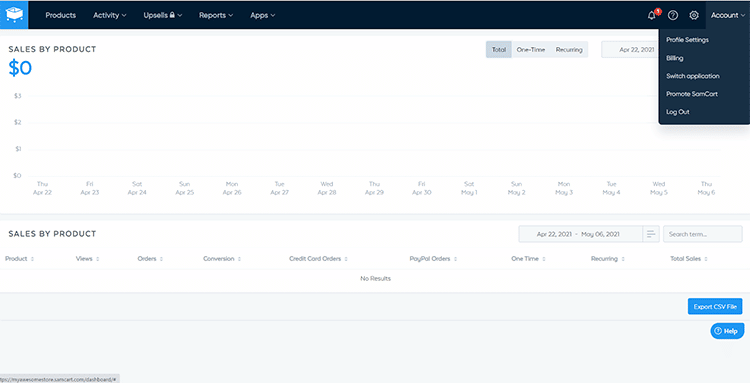
Once you’re done, you can select relevant payment types, such as once-off, split payments, recurring weekly, etc., on your payment processing options and payment plans.
Choose the product type, upload the product image, and then set the discounts and coupons, if any.
The platform’s interface is intuitive and user-friendly, which makes it easy even for total beginners to list their products quickly.
Shopify:
To list your product on Shopify, simply click “Add Product” on your Shopify admin, and enter a title for the product, as well as all the additional details, such as price, transaction fees, variance, availability, etc.
Shopify allows you to save time by duplicating the images, barcodes, and automatic discount codes for inventory management with inventory quantity, SKUs, etc., of a product if you’re selling two or more similar products (a cross-selling bump) included in the Shopify pricing plans.
Alternatively, you can add options to one of your existing products, such as size or color, by adding a variance instead of duplicating it. Select your Shopify Payments options to accept payments on your checkout page using Shopify templates.
Winner: SamCart (Try SamCart Now)
While Shopify allows products to be listed in bulk and more efficiently, I’m going to give this one to Samcart because of its simplicity.
Design Customization
The customization features of an eCommerce platform are an important consideration, especially for beginners with no technical experience.
You need a platform that offers easy use yet powerful customizability so you can build high-quality shopping cart pages and optimize the checkout process.
Let’s see what each platform has to offer.
SamCart:
SamCart makes it easy for you to list your products by providing a number of professionally designed, mobile-responsive templates for mobile devices that you can use to get started quickly with fewer transaction fees.
For instance, you might choose a one-page funnel template that allows you to build a single-page website for selling courses or digital products. This template is also ideal if you only sell a few physical products.
You’ll also find many different checkout templates for your checkout page to make your checkout process quicker and simpler, including payment plans.
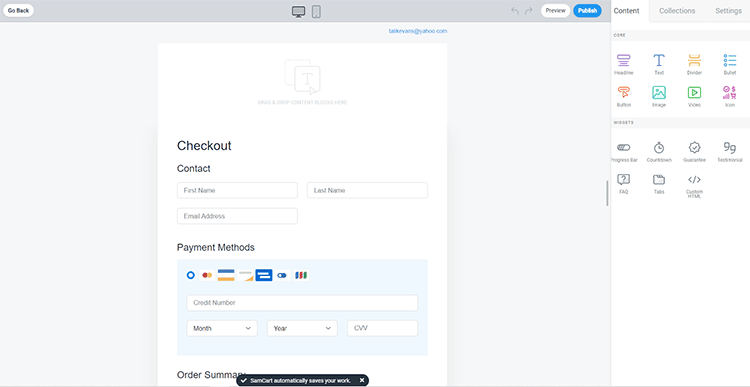
You can easily customize any of the templates with the platform’s drag-and-drop editor, which doesn’t require any technical expertise at all.
All templates on SamCart are free (unlike Shopify), which is one of the main differences between the two platforms’ design customization features.
Also, SamCart offers a lot of helpful documentation in their knowledge base to help beginners shorten the learning curve.
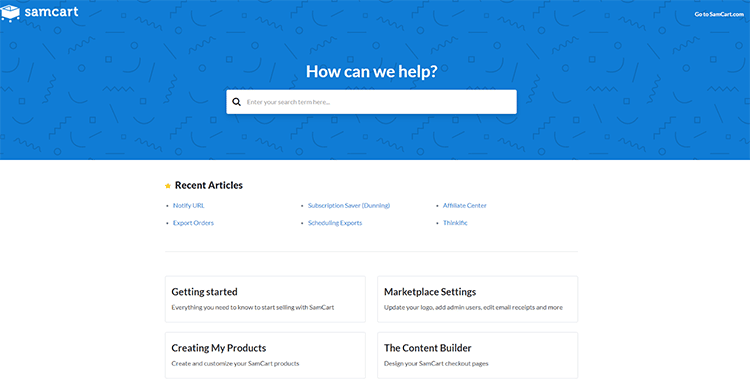
Shopify:
Like SamCart, Shopify also offers a wide range of predesigned templates. Each of them is beautiful, modern, and optimized for high conversions.
But, Shopify doesn’t offer templates for checkout pages. Instead, the platform has fully functional online store themes, each with its own webpage set for any online stores.
Some of the themes are free, and others are premium eCommerce themes that cost between $140-$180.
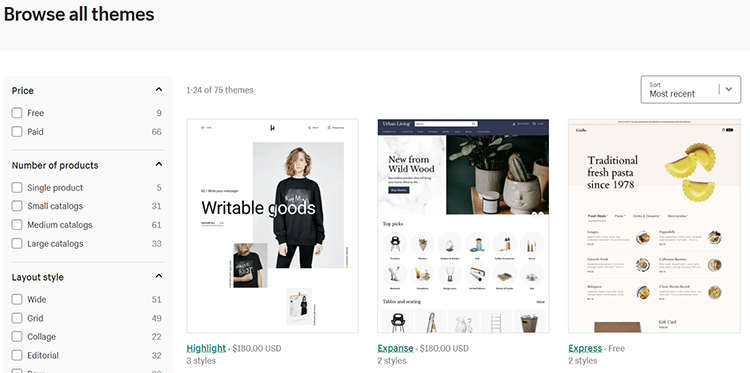
Although SamCart offers better editing options for beginners, Shopify excels in offering deeper customizability for anyone with a basic understanding of CSS and HTML. You will be able to tweak the templates and create truly unique pages.
Winner: SamCart (Try SamCart Now)
SamCart is the winner here because all its templates are free, whereas Shopify charges quite a high amount for most of its themes.
Sales Funnels
Funnels are important for guiding your customers through the sales process, and unless you already have systems in place for building high-converting sales funnels, you have to consider this factor before making a choice between SamCart and Shopify.
Who is going to come out on top in the Samcart vs. Shopify matchup?
SamCart:
SamCart is a standalone online shopping cart and landing page builder. This is the one area where the software excels.
However, this means that if you need to build sales funnels, then you will require another tool to help you achieve that.
Of course, you may be able to build a micro sales funnel thanks to SamCart’s one-click upsell and down-sell functionality, as shown in the image below:
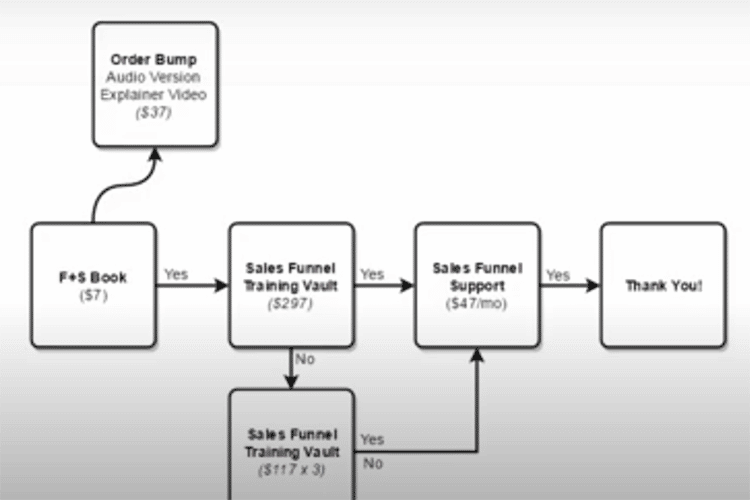
However, this type of funnel isn’t as effective as the type of funnel you would be able to build with Shopify.
Shopify:
Shopify offers the tools you need to build a healthy sales funnel solution for your eCommerce store. You will be able to create funnels that turn visitors into subscribers and customers using powerful marketing automation features.
You also get email marketing tools you can use to collect emails and send messages to nurture your subscribers easily.
The best part is that you can manage every aspect of your marketing efforts from one dashboard. This includes analyzing all marketing activities so you can find ways to optimize your process and make more sales.
Winner: Shopify (Try Shopify Now)
Shopify is undoubtedly the winner here because the platform offers tools for building complete sales funnels.
The only reason someone might consider choosing SamCart over Shopify is if they already have a system in place for creating sales funnels.
Additional Marketing Capabilities
These two platforms also have additional marketing capabilities, which we’re going to look at below.
SamCart:
SamCart is a great platform for selling physical products, digital products, and recurring products, such as monthly memberships and subscription saver.
The e-Commerce platform also allows you to host your digital files on-site to make it easy for customers to instantly access their courses, ebooks, videos, and PDFs.
In addition to that, SamCart also offers a wide range of marketing tools that are designed to not only make it easier for you to run your business but also boost your sales.
This includes custom domains, custom thank-you pages, and a wide range of powerful integrations with over 750 tools and apps.
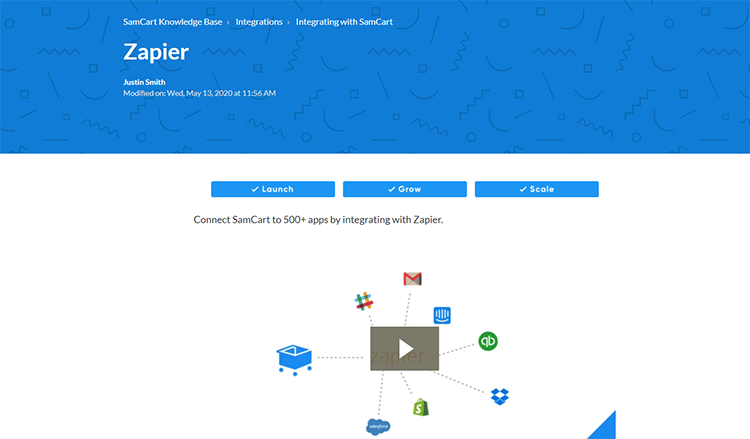
Other revenue-optimization features to help you generate more sales include:
- Pre-purchase order bumps
- One-click upsells
- A/B testing
- Smart pixels tracking
- Advanced Reporting
- Pay what you want (donations)
SamCart also has checkout pop-ups that allow customers to checkout directly from the product page. This is a great tactic for increasing your conversion rates.
There is also a progress bar feature that you can add towards purchase completion.
Furthermore, the platform allows you to include FAQs and optimize your pages for SEO (search engine optimization) using keywords and tags.
In short, SamCart offers exceptional marketing capabilities, and there are endless ways to increase conversions, improve customer service, simplify your business, and much more with its e-Commerce functionalities.
Shopify (with Shopify app store):
In addition to offering themes and mobile-optimized checkout page designs for mobile devices, Shopify also offers a Shopify app that can be used to track sales and data on Android and iOS devices.
You can also get push notifications on your apps so you know whenever a sale is made.
Although the vast majority of people use Shopify for physical products, the platform actually makes it easy to market and sell your digital products and services, such as videos, consultations, courses, and more.
You can also create a membership website on the platform.
Furthermore, Shopify lets you sell your product on a variety of different channels, such as your website, social media, and so on with Shopify e-Commerce features for your online business.
With the platform’s point-of-sale system, customers can:
- Buy online and pick up in-store with digital business processes
- Browse in-store and buy online later
- Buy a product in person and ship it from your warehouse
- Earn rewards for in-store purchases with Shopify eCommerce features
- Purchase in-store, and use the mobile card reader for quicker self-checkout
Some of the platform’s tools for boosting revenue include SEO tools for editing descriptions, keywords, and tags.
You also get Shopify Compass to help you grow your following on Instagram and Shopify lets you create and manage your Facebook ad campaigns directly from your Shopify dashboard.
The platform makes it easy to promote your products on Google Shopping using the Google Shopping app.
The list of awesome features goes on.
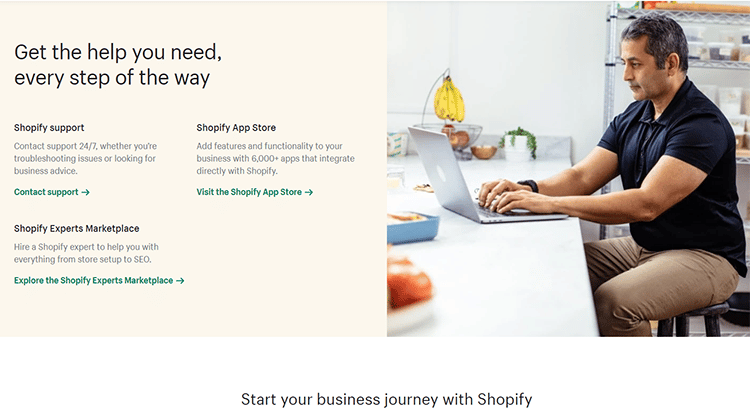
There are also tons of apps in the Shopify App Store that you can use to achieve things like:
- Running promotions
- Collecting email addresses
- Adding pop-ups, welcome bars, sliders
- Getting advanced analytics
- Adding countdown timers on your pages
… and so much more.
The bottom line is that Shopify offers you more ways to please your customers and make the buying process more efficient and convenient for them.
Winner: Shopify (Try Shopify Now)
Both platforms have a lot of marketing and selling tools designed to help you reach a broader audience, boost your sales, and grow your business.
However, unlike SamCart, Shopify is designed to offer you all the necessary eCommerce features you need to build and grow your business. It’s not limited to just tools for checkout pages.
You also get a lot of strong third-party integrations with Shopify compared to SamCart.
Affiliate Program Management
An affiliate management feature will help you get more sales from your own army of affiliates. That’s why it’s important to choose an eCommerce platform with the right affiliate management tools to make your work easier.
SamCart:
SamCart has an inbuilt affiliate center that allows you to create and manage your own strategic affiliate programs.
This is great news for anyone who uses affiliates because it means you don’t have to worry about paying for an external platform.
Affiliate management systems can cost anywhere between $50 and $2,000 per month, and you’ll make great savings when you choose to go to SamCart.
The platform has tools to create tiers and customize your commission rates. SamCart also makes it easy to communicate with the affiliates on your team and supply them with marketing materials.
Shopify:
Although Shopify does not offer a VIP affiliate management program, there are a ton of different apps that you can download from the Shopify app store to help you set up and run your affiliate program.
Some of the leading affiliate program apps include:
- Affersion
- GoAffPro
- Secomapp
- LeadDyno
- Shoutout
Winner: SamCart (Try SamCart Now)
SamCart wins this one because of its in-built affiliate tool, which offers great savings for businesses that run affiliate programs.
Pricing
Pricing is one of the most important factors to consider before making your choice of which platform is best for your business between SamCart vs. Shopify.
You need to ensure that you choose the platform where you only pay for the features you use. It should also be one that allows you to upgrade your plan as your business grows so you can unlock more advanced features and functionality.
Samcart vs. Shopify – what do they offer?
SamCart (with online marketplaces):
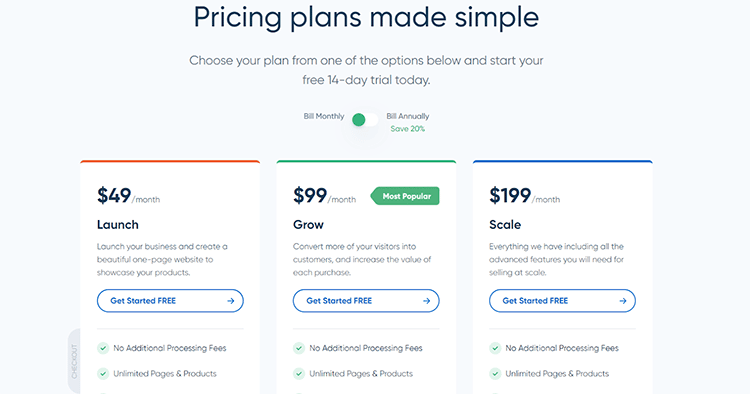
How much does SamCart cost?
Well for starters, SamCart has a free 14-day trial for each of its three plans, which are as follows:
- Launch ($49/month): This plan allows you to create a one-page website and comes with access to the most important features for marketing and selling your products. There is no reporting, and the website has SamCart branding.
- Grow ($99/month): This is the most popular plan, and it comes with three users, multiple payment options, fast payment processing, reporting features, and customer management. There is no SamCart branding on your pages, and you can use pre and post-purchase upsells and add-ons to boost your sales.
- Scale ($199/month): This plan contains all the advanced features to allow businesses to sell at scale. With it, you can have ten users, build an affiliate center, A/B test your pages, and integrate with leading CRM solutions.
Customers can self-cancel subscriptions, and you get custom integrations with a variety of marketing apps and tools. Users on the “Scale” plan also get priority support.
You can view a SamCart demo store without having to sign up for any of the plans.
Shopify:
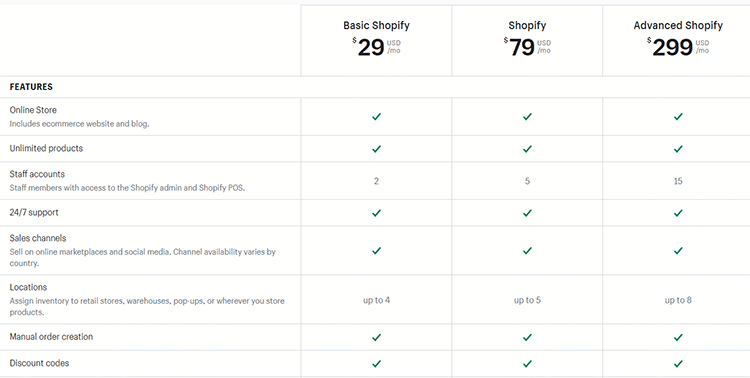
Shopify also has three pricing plans, but a big difference between the two platforms is that Shopify offers a 90-day free trial, which is way longer than SamCart’s 14-day trial.
This gives you more than enough time to decide whether or not Shopify is right for you. Once you’re ready to upgrade, the paid plans are as follows:
- Basic Shopify ($29/month): This plan gives you access to the features you need to build your online store and blog, where you can list unlimited products. It comes with two staff accounts, 24/7 support, and the ability to sell on various other channels, such as online marketplaces, social media, and so on.
- Shopify ($79/month): This plan gives you everything in the basic plan, plus professional reports, additional staff accounts, and in your shipping process with better shipping rates, discounts, and improved credit card charge rates. You also get more locations to assign inventory.
- Advanced Shopify ($299/month): With this plan, you can add up to 15 staff accounts and eight inventory locations, such as retail stores, pop-ups, warehouses, other bonafide online shops, or wherever you store your products. You get shipping discounts up to 72%, an advanced custom reports builder, and much more.
Winner: Shopify (Try Shopify Now)
Each of SamCart’s plans is a bit pricey compared to Shopify, especially when you consider that Shopify has a wider range of eCommerce features.
Reporting
As a marketer, you know how important it is to be able to track your visits, sales, conversion rates, revenue, etc., in order to ensure that your online store is performing well.
Both platforms offer analytics and reporting features designed to help you optimize your business operations. Let us explore the matchup between Samcart vs. Shopify.
SamCart:
On SamCart, you can create custom reports that allow you to track a variety of important metrics, such as:
- Pageviews
- Sales
- Conversion rates
- Customer lifetime value
- Returns
… and much more.
You can also connect your entire online store to Google Analytics using Zapier to get even deeper insights and find ways to improve and grow your business.
However, it’s important to note that these reporting features are not available on SamCart’s basic “Launch” plan.
To make use of them, you will have to opt for the “Grow” plan, which costs $99/month.
Shopify:
Shopify’s analytics tools offer you everything you need in order to understand your store’s performance.
You can send and track emails from the same place where you manage your products, customers, and digital marketing campaigns.
You will get actionable reports on your dashboard showing you metrics such as open email rates, sales, conversion rates, and more.
The information provided is easy to read, making it possible for you to get useful insights that help you refine your approach to get better results over time.
As with SamCart, you can also connect your Shopify store to Google Analytics. In addition, you can use Shopify apps from Shopify’s app store to dive even deeper into everything from your inventory to your sales.
Here are some of the most commonly used apps:
- Conversific: Store Analytics
- Better Reports: Reporting App
- Glew: Multichannel Analytics
- Lifetime: Profit and LTV
- Trackify X: Facebook Pixel App
Winner: SamCart (Try SamCart Now)
In terms of reporting, SamCart wins by a mile. Unfortunately, Shopify only offers an advanced report builder on their “Advanced Shopify” plan, which costs $299/month.
SamCart, on the other hand, offers a dashboard & sales report on their “Launch” plan. The higher-priced plans come with advanced reporting, UTM tracking & marketing reporting, schedule reports, and more.
Final Thoughts
So, now that you know more about each of these platforms, I hope you have a better idea of which one is best for your business to sell products online.
Just remember, these platforms are both great options that provide tons of value, but although they may have similar functions, they have different features that make each ideal for a specific scenario.
Use SamCart if:
You only have a single product to sell, or you are a digital marketer, course creator, or Blogger online selling digital products.
SamCart is also ideal if you already have a system in place for creating sales funnels and only require a shopping cart to help you sell your products.
In such a case, SamCart would be a great option for you because it’s designed to help you create amazing single-page websites to sell a few products and maximize your sales with order bumps, one-click upsells, etc.
The platform is specifically designed to help you make more money from every customer who arrives on your checkout page.
Lastly, it’s worth mentioning the Samcart has also created CreatorU to help online business owners become more successful in their endeavors.
Read the SamCart review here and check out Samcart Alternatives here.
Use Shopify if:
You do 100% eCommerce and require a store for online selling. Shopify is also ideal for you if you need more than just a shopping cart for online selling your eCommerce products.
The platform will give you all the tools and flexibility you need to build high-converting pages, including blogs.
It also has more features to help you market and sell your products to a global audience on different channels.
Check out my Shopify comparisons here:
